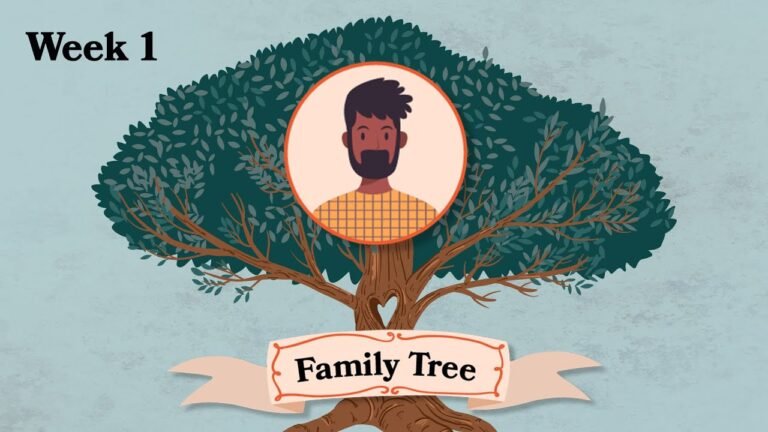Unraveling the Family Tree of Abraham
The family tree of Abraham serves as a foundational narrative in the religious and cultural histories of Judaism, Christianity, and Islam. As the patriarch of three major faiths, Abraham’s lineage is rich with stories of faith, struggle, and divine promise. Exploring this intricate family tree reveals not only the historical connections among these religions but also highlights the enduring legacy of Abraham’s descendants, shaping the spiritual and cultural landscapes of millions around the world.
Who are the members of Abraham’s family?
Abraham stands as a pivotal figure in religious history, recognized as the patriarch of the Israelite people through his son Isaac. Born to Abraham and his wife Sarah in their later years, Isaac symbolizes the fulfillment of God’s promise to Abraham. Through Isaac, the lineage of the Israelites continues, establishing a foundation for a rich cultural and spiritual heritage.
In addition, Abraham is also regarded as the patriarch of the Arab people through his son Ishmael, whom he had with Hagar, Sarah’s Egyptian servant. This connection highlights the significant role Abraham plays in the histories of both the Israelites and Arabs, emphasizing his enduring legacy as a father of nations and a unifying figure across diverse cultures.
Who are the genuine descendants of Abraham?
The true descendants of Abraham primarily trace their lineage through his two sons, Isaac and Ishmael. Isaac, the child of promise, fathered Jacob and Esau, with Jacob later becoming the father of the twelve tribes of Israel. This line is significant in the context of Judaism and Christianity, as it establishes the foundation of the Israelite nation.
On the other hand, Ishmael, Abraham’s firstborn, is considered the progenitor of many Arab nations. His descendants have played a vital role in the historical and cultural development of the Middle East. Together, the descendants of Isaac and Ishmael represent the rich tapestry of heritage that continues to influence the world’s religious and cultural landscapes today.
What lineage does Abraham have in the Bible?
Abraham, regarded as the father of many nations, traces his lineage back to Noah through his son Shem. Living in the ancient city of Ur in Chaldea, which is situated in present-day Iraq, he was part of a significant ancestral line that would shape the course of biblical history. His life journey began with a departure from Ur, motivated by divine calling and family ties, leading him to become a pivotal figure in the faith traditions of Judaism, Christianity, and Islam.
After leaving Ur, Abraham, accompanied by his father Terah, wife Sarah, and nephew Lot, settled in Haran for a time. This period was marked by familial bonds and the challenges of migration, eventually laying the groundwork for Abraham’s covenant with God. The death of Terah in Haran signified a turning point, as Abraham would go on to fulfill his divine mission, establishing a legacy that would resonate through generations.
Abraham’s bloodline is not just a matter of genealogy; it represents a profound spiritual inheritance. His descendants, notably Isaac and Jacob, would carry forward the promises made to him, forming the foundation of the Israelite nation. This bloodline highlights the intersection of faith, identity, and divine purpose, making Abraham a central figure in the narrative of scripture and a symbol of hope for countless believers.
Discovering the Roots of a Patriarch
In the heart of a bustling city, a neglected archive beckons to those curious about the intricate tapestry of family legacies. Within its dusty shelves lie stories of resilience and ambition, tracing the lineage of a patriarch who once laid the foundation for generations to come. Each document unearthed reveals a glimpse into the past, shedding light on the challenges faced and the triumphs celebrated. As descendants sift through these artifacts, they not only discover their roots but also rediscover the values and traditions that continue to shape their identity today. This journey into their heritage is not just a search for names and dates, but a profound exploration of the bonds that tie them to their ancestors and the enduring impact of their legacy.
Tracing Generations: Abraham’s Legacy
Abraham’s legacy transcends time, weaving a rich tapestry of faith, resilience, and cultural identity that continues to inspire millions across the globe. As a pivotal figure in Judaism, Christianity, and Islam, his story serves as a foundational narrative that unites diverse traditions and beliefs. Through his unwavering commitment to his convictions and his profound relationship with the divine, Abraham exemplifies the enduring power of faith in shaping moral values and guiding generations.
The impact of Abraham’s life is evident in the teachings and practices of his descendants, who have carried forward his ideals of hospitality, justice, and devotion. Each generation has interpreted and reinterpreted his legacy, ensuring that his lessons remain relevant in an ever-changing world. From ancient texts to modern discussions, the essence of Abraham’s journey continues to resonate, reminding us of the importance of understanding our roots and embracing the shared humanity that connects us all.
Family Connections: The Abrahamic Lineage
The Abrahamic lineage weaves a rich tapestry of shared history and values among Judaism, Christianity, and Islam, tracing its roots back to the patriarch Abraham. Each faith reveres him not only as a spiritual ancestor but also as a symbol of unity and faithfulness. This common heritage fosters interfaith dialogue and understanding, highlighting the profound connections that bind these diverse traditions. By exploring the stories and teachings that stem from Abraham’s legacy, we unveil a shared commitment to justice, compassion, and community, illuminating the ways in which these religions can coexist harmoniously while celebrating their distinct identities.
The family tree of Abraham reveals not just the lineage of a pivotal figure in religious history, but also the intricate tapestry of faith, culture, and tradition that has shaped countless lives across generations. By exploring this ancestral connection, we gain insight into the shared heritage that unites diverse communities, highlighting the enduring significance of Abraham’s legacy in fostering relationships and understanding among different faiths. Embracing this rich history encourages us to reflect on our own roots and the values that bind us together as a global family.







